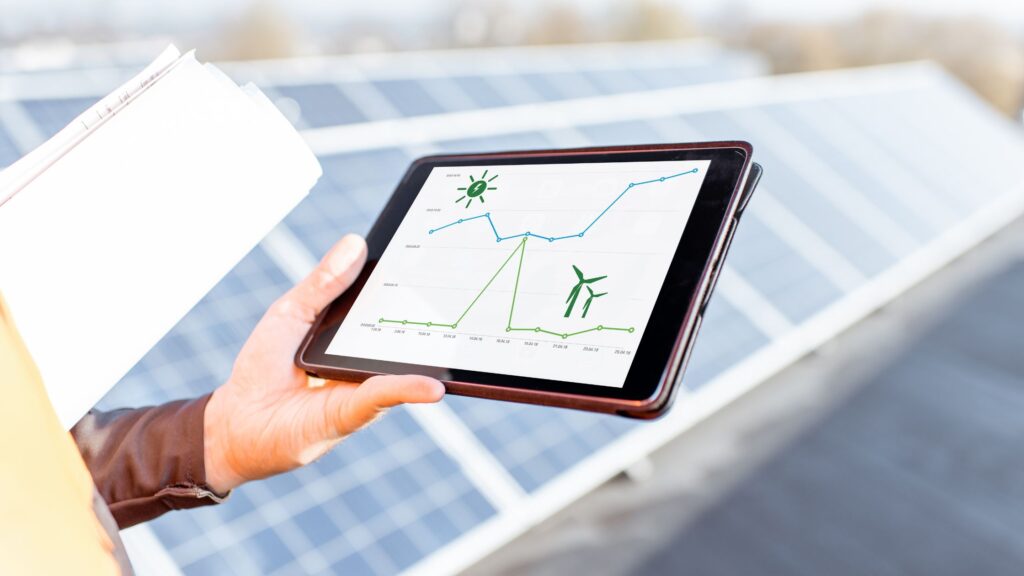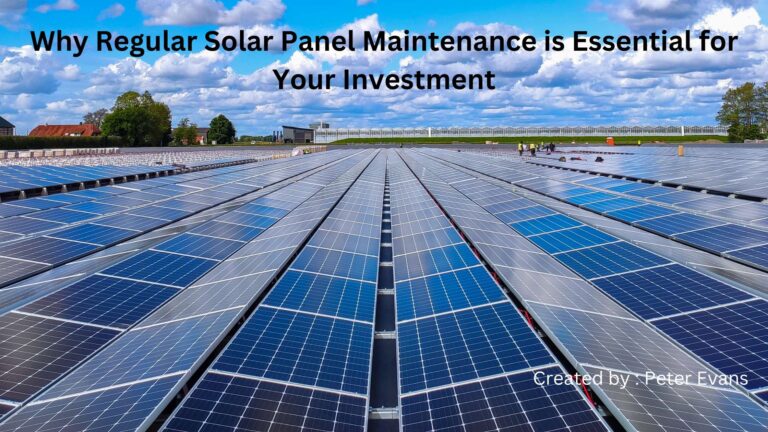Maximizing Your Investment: A Comprehensive Guide to Solar Panel ROI
With the increasing demand for clean energy and a shift towards sustainable practices, solar panels have become a popular investment for homeowners and businesses in the United States. By harnessing the power of the sun, solar panels not only reduce reliance on non-renewable energy sources but also provide a cost-effective solution for electricity consumption. By far, one of the most significant advantages of solar panels is the return on investment (ROI). Solar panels offer long-term financial and environmental benefits.
In this article, we will delve into the history of solar panels in the United States and explore the ROI of solar panel installations, providing insight into the financial benefits and considerations of going solar.
Understanding Solar Panel ROI
Before we get into the factors that affect solar panel ROI, it’s essential to know what ROI is. ROI is a financial metric used to evaluate the efficiency of an investment. In simpler terms, it is the percentage of return you can expect from your investment over time.
Solar panel ROI is calculated by dividing the lifetime savings generated by the solar panels by the initial cost of the system. The lifetime savings include the money you save on your electricity bill and any incentives you receive from the government or utility companies.
The average solar panel ROI ranges from 7% to 20%, depending on several factors, such as location, system size, and financing options. The goal is to maximize your solar panel ROI by understanding the factors that affect it and optimizing your investment.

Factors that Affect Solar Panel ROI
Several factors affect solar panel ROI, and it’s crucial to consider them before investing in a solar panel system. The following are some of the most critical factors that can impact your solar panel ROI.
Location
Your location plays a significant role in determining your solar panel ROI. The amount of sunlight your panels receive affects how much electricity your system generates. Areas with more sunlight generate more electricity, which translates to higher savings and faster ROI.
System Size
The size of your solar panel system also affects your ROI. A larger system generates more electricity, which means higher savings and a faster ROI. However, a larger system also comes with a higher upfront cost.
Energy Consumption
Your energy consumption is another critical factor that affects your solar panel ROI. The more electricity you consume, the more you can save with solar panels. For example, a family of four that uses a lot of electricity will save more with solar panels than a single person living in a small apartment.
Incentives
Incentives such as tax credits, rebates, and net metering can significantly impact your solar panel ROI. These incentives can reduce your upfront costs, increase your savings, and speed up your ROI.
Calculating Solar Panel ROI
Calculating your solar panel ROI can help you determine how much you can save with solar panels and how long it will take to recoup your investment. The following steps will help you calculate your solar panel ROI.
- Determine the total cost of your solar panel system, including installation, permits, and any additional costs.
- Estimate your average monthly electricity bill and multiply it by 12 to get your annual electricity cost.
- Calculate your annual solar panel production by multiplying your system size by the average number of hours of sunlight in your area.
- Multiply your annual solar panel production by the cost per kilowatt-hour (kWh) of electricity in your area to get your annual savings.
- Add up your annual savings for the lifetime of your solar panel system.
- Divide your lifetime savings by the total cost of your solar panel system to get your solar panel ROI.
Ways to Maximize Solar Panel ROI
Now that you understand the factors that affect solar panel ROI and how to calculate it, it’s time to explore ways to maximize your solar panel ROI. The following are some ways to optimize your solar panel investment.
Choose the Right System Size
Choosing the right system size is crucial to maximizing your solar panel ROI. A larger system generates more electricity, which means more savings and faster ROI. However, a larger system also comes with a higher upfront cost. It’s essential to determine your energy consumption and choose a system size that meets your needs while staying within your budget.
Optimize Your Energy Usage
Optimizing your energy usage is another way to maximize your solar panel ROI. Simple steps such as using energy-efficient appliances, turning off lights when not in use, and adjusting your thermostat can significantly reduce your energy consumption, resulting in more savings.
Take Advantage of Incentives
Incentives such as tax credits, rebates, and net metering can significantly impact your solar panel ROI. These incentives can reduce your upfront costs, increase your savings, and speed up your ROI. It’s essential to research and take advantage of all the incentives available in your area.
Consider Financing Options
Financing options such as solar loans, leases, and power purchase agreements (PPAs) can help make solar panel investment more affordable. These options allow you to pay for your solar panel system over time, making it easier to manage your cash flow and maximize your ROI.
Government Incentives for Solar Panel Investment
The government provides several incentives for solar panel investment, such as tax credits, rebates, and grants. These incentives can significantly reduce your upfront costs, increase your savings, and speed up your ROI.
Federal Tax Credit
The federal government provides a tax credit of up to 26% of the total cost of your solar panel system. This tax credit applies to both residential and commercial solar panel systems and can significantly reduce your upfront costs.
State and Local Incentives
Many states and local governments provide additional incentives for solar panel investment, such as rebates, grants, and tax credits. These incentives vary by location, and it’s essential to research the incentives available in your area.
Net Metering
Net metering is a billing arrangement that allows you to sell excess electricity generated by your solar panel system back to the grid. This arrangement can significantly increase your savings and speed up your ROI.
Financing Options for Solar Panel Investment
Financing options such as solar loans, leases, and power purchase agreements (PPAs) can help make solar panel investment more affordable. These options allow you to pay for your solar panel system over time, making it easier to manage your cash flow and maximize your ROI.
Solar Loans
Solar loans are a type of financing that allows you to borrow money to pay for your solar panel system. These loans typically have lower interest rates than traditional loans and allow you to pay back the loan over time, making it easier to manage your cash flow.
Solar Leases
Solar leases are a type of financing that allows you to lease a solar panel system for a set period. The lease payments are typically lower than the savings generated by the system, resulting in immediate savings.
Power Purchase Agreements (PPAs)
Power Purchase Agreements (PPAs) are a type of financing that allows you to purchase the electricity generated by a solar panel system at a discounted rate. This arrangement allows you to save on your electricity bill without having to purchase the system outright.
The Environmental Benefits of Solar Panel Investment
Investing in solar panels not only provides financial benefits but also has several environmental benefits. The following are some of the most significant environmental benefits of solar panel investment.
Reduced Carbon Emissions
Solar panels generate electricity without emitting harmful greenhouse gases, making them a clean and renewable source of energy. Investing in solar panels can significantly reduce your carbon footprint and help mitigate climate change.
Conservation of Natural Resources
Investing in solar panels reduces the demand for fossil fuels, which are finite resources. Solar panels generate electricity using the abundant energy from the sun, making them a sustainable and renewable source of energy.
Protection of Ecosystems
The extraction and transportation of fossil fuels can have a significant impact on ecosystems, such as oil spills and habitat destruction. Investing in solar panels reduces the demand for fossil fuels, helping to protect ecosystems and biodiversity.
The Economic Benefits of Solar Panel Investment
Investing in solar panels not only provides financial and environmental benefits but also has several economic benefits. The following are some of the most significant economic benefits of solar panel investment.
Job Creation
Investing in solar panels creates jobs in the solar industry, such as installation and maintenance. The growth of the solar industry has the potential to create thousands of jobs and stimulate local economies.
Increased Property Value
Investing in solar panels can increase the value of your property. A solar panel system can make your property more attractive to buyers and increase its resale value.
Energy Independence
Investing in solar panels provides energy independence, allowing you to generate your electricity and reduce your reliance on the grid. This independence can provide long-term financial stability and security.
Common Misconceptions About Solar Panel Investment
Despite the numerous benefits of solar panel investment, there are still several misconceptions about solar panels. The following are some of the most common misconceptions and the truth behind them.
Solar Panels are Expensive
While the upfront cost of solar panels can be high, the long-term financial benefits outweigh the initial investment. Government incentives and financing options can significantly reduce the upfront costs, making solar panels more affordable.
Solar Panels Don’t Work in Cloudy Weather
Solar panels can still generate electricity on cloudy days, although the amount of electricity generated may be lower. Additionally, modern solar panel systems are designed to optimize energy production, even in less-than-ideal conditions.
Solar Panels Require a lot of Maintenance
Solar panels require minimal maintenance, with most systems only needing to be cleaned periodically. Solar panel systems typically come with warranties and last for decades, providing long-term savings and minimal maintenance.
Investing in Solar Panels for a Better Future
Investing in solar panels provides a long-term financial, environmental, and economic benefits. By understanding the factors that affect solar panel ROI, calculating your ROI, and optimizing your investment, you can maximize your savings and speed up your ROI. Government incentives and financing options can significantly reduce your upfront costs, making solar panel investment more affordable.
Investing in solar panels provides energy independence, reduces your carbon footprint, and protects ecosystems. Additionally, investing in solar panels creates jobs and stimulates local economies. Despite the common misconceptions about solar panels, the long-term financial and environmental benefits make them a worthwhile investment for a better future.

Solar Energy Engineer, Founder of Solar Panel Guide Blog, and passionate advocate for a sustainable future. ☀️🌿 #SolarEnergy #Renewables Read More About Peter

